 October 07
October 07
Sleeping with One Eye Open: Israel at Sixty
Scott Copeland
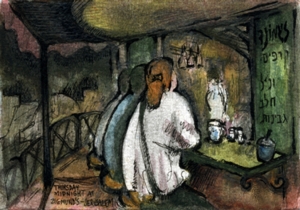 Usually I sleep well. Along our quiet suburban street on the outskirts of Jerusalem, with the lights of Ramot and Beit Iqsa watching each other in furtive silence, only the occasional sounds of dogs chasing between the garbage cans rattles the night. However, on those nights that I can't sleep, particularly after a harsh news day – and those are not atypical in Israel – one cannot help but ask where we are headed.
Usually I sleep well. Along our quiet suburban street on the outskirts of Jerusalem, with the lights of Ramot and Beit Iqsa watching each other in furtive silence, only the occasional sounds of dogs chasing between the garbage cans rattles the night. However, on those nights that I can't sleep, particularly after a harsh news day – and those are not atypical in Israel – one cannot help but ask where we are headed.
Milan Kundera wrote in 1994’s Testaments Betrayed:
Small peoples. The concept is not quantitative; it points to a condition; a fate; small peoples do not have that felicitous sense of an eternal past and future; at a given moment in their history, they all passed through the antechambers of death; in constant confrontation with the arrogant ignorance of the mighty, they see their existence as perpetually threatened or with a question mark hovering over it; for their existence is the question.
Or to paraphrase: Being a small people is about waking in the middle of the night unsure that you will still be there in the morning.
Foxes Wander There
In a meeting over the summer with a group of Israelis who work with American Jewish communities on improving Israeli social and cultural services, conversation focused on the upcoming year and sixty years of Israeli independence. A colleague asked, "Let’s put ‘Israel at 60’ aside for a moment. In ten years time, how would you want to mark Israel at 70?" A distinct giggle rippled around the room. One of the participants said, not quite out loud, but loud enough to hear, "If we make it."
Just over one year after the Second Lebanon War, Israel’s mood teeters between the cynical and the apocalyptic, its angst following a long tradition of small nations pondering their uncertain futures. For a small nation – like the Jews or the Palestinians or the Irish or the Armenians or the Czechs – histories fraught with collective near death experiences teach that survival cannot be taken for granted.
Kundera suggests that small peoples "do not have that felicitous sense of an eternal past and future." It could be that the Jews were formed as a different kind of small people, a small people who, in their pre-modern religious-ethnic consciousness, did possess a "felicitous sense of an eternal past and future."
Notions of Jewish chosenness already appear in the Hebrew Bible, and the sprouting seeds of the messianic idea in the Second Temple period granted the Jews the hope that – regardless of the travails and indignities of human history – at some future time national redemption was assured.
Poised between the destruction of Jerusalem by Rome and the outbreak of the Bar Kochba Revolt in the 1st and 2nd centuries, Rabbi Akiva asserted that the vise of history could not crush the Jewish future. When witnessing the ruins of the Temple and Jerusalem and upon hearing the howling of foxes having replaced the songs of the Levi'im on the Temple Mount, Akiva taught that "if the prophets warn ‘Mount Zion will be deserted, and foxes will wander there’ and that even if the destruction of Jerusalem is in fact all around us, the prophets also promise that a day will come ‘when the elderly will sit in the streets of Jerusalem, leaning on their canes, ripe with age.’ Akiva's faith would not allow him to accept that the people chosen by the God of History could be defeated by History.
During the Roman suppression of the Bar Kochba Revolt, Akiva and his comrade-teachers were publicly executed by the Romans in the arena at Caesarea. And while Akiva’s hope against hope was admirable, it was also an important ingredient in launching a reckless revolt against Rome whose scars the Jewish people bear until today. The security that Akiva and generations of Jews held that redemption may not be around the corner, but rather is inevitable, has disappeared from the lives of most Jews. After the Emancipation and the Enlightenment and the Shoah, tablets smashed on the mountain of modernity cannot be reassembled without jagged cracks and missing shards. Turning back the clocks of consciousness, despite all wishful thinking, is not an option.
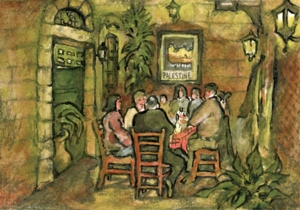 Today, growing social gaps, public corruption, and the Second Lebanon War all contribute to the daily load that weighs heavily on Israeli shoulders. Iranian nuclear aspirations only contribute to that weight. In recent years, Israelis requesting and receiving European Union passports – over 4000 from Germany and 1200 from Poland in 2005 alone – is a an additional sign that confidence about Israel’s future is quite something less than iron clad. Avraham Burg, once the golden boy of the Labor party, past head of the Jewish Agency, and also formerly speaker of the Knesset recently encouraged “whoever can” to take additional passports.
Today, growing social gaps, public corruption, and the Second Lebanon War all contribute to the daily load that weighs heavily on Israeli shoulders. Iranian nuclear aspirations only contribute to that weight. In recent years, Israelis requesting and receiving European Union passports – over 4000 from Germany and 1200 from Poland in 2005 alone – is a an additional sign that confidence about Israel’s future is quite something less than iron clad. Avraham Burg, once the golden boy of the Labor party, past head of the Jewish Agency, and also formerly speaker of the Knesset recently encouraged “whoever can” to take additional passports.
Yet despite Israel’s deep ideological and existential challenges, most discussions of Israel’s future tend to focus on security in the military sense, and on our ongoing, often excruciating relations with our Palestinian neighbors. Granted, our own self-determination can never be fully realized if theirs is not. With that said, self-determination, or what Leon Pinsker called “auto-emancipation,” is something that can never be granted by another entity. It must be earned through responsible behavior. The ultimate realization of Palestinian self-determination is up to the Palestinians and their leadership, and their successes and/or failures will depend on their own choices. The successes and failures of Israel will depend on the citizens of the State of Israel, and on the Jewish people around the world. The security of Israel, in the sense of its ability to maintain and strengthen Israel as both a democratic society and as the national home for the Jewish people, will depend on a number of key internal challenges that are no less important than Israel’s relations with the Palestinians. Among those challenges, the following – although they do not exhaust the potential list – are crucial.
Leadership
When Ariel Sharon suffered his second massive stroke in the winter of 2005, the Israeli media ran 24-7 coverage that lasted for over a week. In a country where headlines change like traffic lights, the sustained attention to Sharon's condition was highly unusual. As the public eye maintained watch on Sharon’s condition and with no real news to report, reporters began to interview each other. The coverage of the story replaced the story. With no small dose of historic irony, Ariel Sharon was a deeply popular prime minister. Many people spoke of his illness and his leadership as if they were speaking of a beloved father or grandfather. Sharon's exit from the public arena signaled a c-note shift in Israeli politics. He was the last of the Israeli "grandfathers" to head the State of Israel, the last of the generation who was present at the birth of the State of Israel as well as serving as a captain of the ship of state. It was as if the Israeli public believed that those leaders who had been present at the birth of modern Israel had some guiding map that assisted them in navigating our ship towards safer waters.
Even if Ehud Olmert, Amir Peretz, and Dan Halutz had not led the country to war in July of 2006 in a fashion riddled with "serious failings," they would have had an extremely difficult time persuading the Israeli public that they were of the caliber of David Ben Gurion or Yitzhak Rabin. As the Winograd Commission Interim Report points out, none of the three acted with the required humility, forethought, and care needed to make the decision to go to war or to realize its stated operational goals. According to the interim report, each of the three failed in carrying out the duties and responsibilities expected of them by the Israeli public.
The passing of the founding generation and the poor performance of Ariel Sharon's immediate successors since the summer of 2007 opened up the door for a new breed of Israeli demagogue, ready to buy the crowd with bread and circuses, but lacking any vision for Israel as a Jewish and democratic state. In desperate search for leadership, the election of Shimon Peres as Israel's 9th president was greeted exuberantly by most Israelis. Although Israeli political common wisdom marked Peres as a perennial loser, the Israeli public breathed a sigh of relief knowing that the battered institution of the presidency would be taken over by a figure who began his career alongside David Ben Gurion, by an elder statesman who had was present when the ship of Israeli state left port sixty years ago.
Solidarity
Theodor Herzl's visionary pamphlet "The State of the Jews" was based on a vision of national solidarity: "We are a people – one people." It was the assumption that all Jews are brothers and sisters and responsible one for another. During the pre-state and early state years, the driving Labor Zionist ethos encouraged a broad sense of equality and established institutions that became the basis of the Israeli welfare state. No doubt that during the years of Labor hegemony, there was also some level of corruption and of political cronyism. However, it is also true that during the early 1950's, Israel was one of the most equal societies in the world.
Today, alongside the United States and Russia, Israel holds the dubious international honor of possessing one of the widest gaps between its poorest and wealthiest citizens. The systematic dismantling of Israel's mixed economic model, especially since the mid 1990's, encouraged economic growth, but concentrated the fruits of that growth in a very small sector of the population. In 2007, 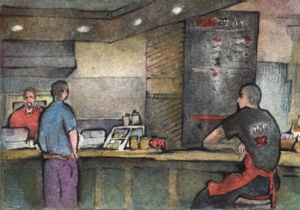 20% of the Israeli population lives under the poverty line, including 35% of Israeli children. And the weakest only get weaker. Among the hardest hit are Israeli Arabs, the ultra-Orthodox, and the development towns of the Negev and the Galilee. Poverty is a national security threat of the highest order. In a situation where rhetoric of social solidarity is backed up by bearable economic gaps, communities of various means and resources can still imagine themselves to share the same fate. They can work together, celebrate together, and if necessary, fight together for a shared future. However, in an economic situation where gaps become increasingly unbearable, even a well intentioned rhetoric of solidarity will collapse under the hypocrisy reflected by people's day to day realities. In such a case, people's ability to stand together as one society – as one state – will be sorely threatened.
20% of the Israeli population lives under the poverty line, including 35% of Israeli children. And the weakest only get weaker. Among the hardest hit are Israeli Arabs, the ultra-Orthodox, and the development towns of the Negev and the Galilee. Poverty is a national security threat of the highest order. In a situation where rhetoric of social solidarity is backed up by bearable economic gaps, communities of various means and resources can still imagine themselves to share the same fate. They can work together, celebrate together, and if necessary, fight together for a shared future. However, in an economic situation where gaps become increasingly unbearable, even a well intentioned rhetoric of solidarity will collapse under the hypocrisy reflected by people's day to day realities. In such a case, people's ability to stand together as one society – as one state – will be sorely threatened.
Environment
The Zionist endeavor included a biting critique of the largely urban Jewish life of the Diaspora and sought a return to nature, a renewed union between the Jewish people and the Land of Israel. Although the majority of Israelis live in small towns and cities, Israeli culture has developed a unique relation to the vistas of the country – to encountering and preserving the flora and fauna as well as the historical-cultural resources of a tiny strip stretched between the Mediterranean and the desert's edge. At the same time, the Zionist movement sought to establish a national home for the Jewish people, a home that included an infrastructure capable of receiving new immigrants, of providing housing, and of developing a vibrant economic and cultural life. In 2007, the Israeli population numbered some 7,150,000 residents. Since 1948, the Israeli population has grown by some 900%. Obviously, the basic physical resources of the Land of Israel have not grown to meet the tremendous population growth. Like in 1948, the sovereign State of Israel in 2007 (within the pre-1967 cease fire lines) remains a diminutive 8019 square miles.
Israel’s water resources are shrinking. Its air is more polluted. And its green land resources shrink from year to year as new housing, roads, and shopping mall dominate the landscape. As natural resources are strained and abused, even the unique landscape of the Judean Desert’s Dead Sea is under attack. Based on an annual falling water level of approximately 1.2 meters, much of the Dead Sea’s southern basin has dried out. From the middle of the 1990's, more than 1000 craters have developed all along the Eastern shores of the Dead Sea from Kaliya to Masada. The craters are nature's warning that delicate balances have been upset and that a price must be paid. In the Negev, growing areas have become dumping grounds for landfill and garbage brought from the center of the country. As Martin Buber pointed out to Gandhi in their 1939 exchange:
It seems to me that God does not give any one portion of the earth away, so that the owner may say as God says in the Bible: ‘For all the earth is Mine’ (Exodus 19:5). The conquered land is, in my opinion, only lent even to the conqueror who has settled on it – and God waits to see what he will make of it.
Buber was not speaking directly about environmental issues, yet his message was clear: the degradation of the land will ultimately lead to the degradation of the people who live on the land.
And at the same time, Israel is a country with tremendous ecological promise. It is the only country to 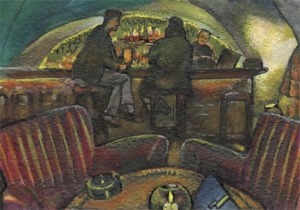 significantly increase its number of planted trees in the last half century. Recent research and commercial pioneering in solar energy are ready to take a more central role on the Israeli stage. The Jerusalem Post recently reported that an Israeli company will build the world's largest solar energy park in the Mojave Desert. The possibilities that await our work in the environmental arena wait in other spheres of our life as well.
significantly increase its number of planted trees in the last half century. Recent research and commercial pioneering in solar energy are ready to take a more central role on the Israeli stage. The Jerusalem Post recently reported that an Israeli company will build the world's largest solar energy park in the Mojave Desert. The possibilities that await our work in the environmental arena wait in other spheres of our life as well.
Challenge and Celebration
Sixty years of Israeli independence is a time for celebration. Every year that Israel arrives at another birthday – despite all of its challenges – is a time for celebration. Under a constant barrage of information both complex and blunt, it is easy to lose perspective. Sixty-five years ago the surviving remnants of the Jewish people were largely refugees. In Allied-occupied Germany, over 250,000 Jewish refugees struggled to rebuild broken lives. The great seedbeds of Jewish culture of Eastern and Central Europe had been decimated. Reflecting on this historical moment with passion and insight, Avraham Infeld writes:
The State of Israel is important to us for many reasons. One is the fact that until sixty years ago the most common description of the Jew was a refugee – a wanderer, the wandering Jew. The State of Israel erased that phrase from the slate, a change of import to every Jew.
For this reason alone the Zionist movement and the State of Israel deserves to be celebrated. It radically altered the Jewish people's historic standing – from a position of powerlessness to the power of sovereignty with all of its associated limits and responsibilities.
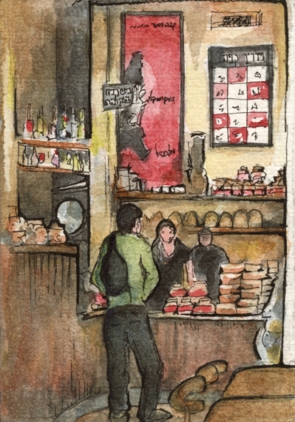 Although Israel’s demographic future is precarious, Israel has succeeded in reversing one of the most basic realities of Jewish life since the destruction of Jerusalem by Babylon. For the first time in thousands of years, the Jewish community of the Land of Israel is one of the two largest in the world. Within the next half century, it will be the largest. Israel is the only place in the world where a Jewish community is growing because of natural birth rates. Based on this awesome historic responsibility, it is even more crucial that the State of Israel draw secure and well defined borders.
Although Israel’s demographic future is precarious, Israel has succeeded in reversing one of the most basic realities of Jewish life since the destruction of Jerusalem by Babylon. For the first time in thousands of years, the Jewish community of the Land of Israel is one of the two largest in the world. Within the next half century, it will be the largest. Israel is the only place in the world where a Jewish community is growing because of natural birth rates. Based on this awesome historic responsibility, it is even more crucial that the State of Israel draw secure and well defined borders.
The creation of a Jewish farhessia – of a Jewish public square that operates in Hebrew and draws a strong part of it’s inspiration from the cultural resources and historical experience of the Jewish people – offers a new, revolutionary form of Jewishness and tremendous opportunities for a living, dynamic debate over Judaism. Today we take for granted that Hebrew is the language at the Technion, at the Supreme Court and supermarket and police station. We take for granted that the cycle of the Jewish calendar year forms the communal heartbeat of Israeli culture. Even in Israel’s so-called secular schools, children – with all of the shortcomings of the existing system – are immersed in a way of life where Jewishness is lived and not only learned. The Hebrew revolution transformed Jewishness from an object of study to part of the air that Israelis breathe.
I recall with great pride my now teenage daughter as a kindergartener. Like all parents sometimes do, I scolded her about some trivial transgression. Yael, always confident and articulate, went into her room and closed the door. After a few minutes, she emerged. Standing before me with hands clenched on hips, she reprimanded me for raising my voice, proclaiming: “Ma she’sanu aleikha al taaseh l’haverkha!” (“What is hateful to you do not do to another!”) My 5 year old was quoting Hillel, the greatest sage of the period when the Second Temple still stood, in order to explain to her embarrassed and beaming father about the essence of ethical behavior – and this was the result of Israeli public education.
The greatest achievement of Zionism and the State of Israel is the creation of a situation where Jewish culture and identification is being fashioned anew. Israel is the arena for a living debate about who Jews are and who Jews want to be. In that sense, Judaism in Israel is not a fossilized relic frozen in essentialist categories, but rather Judaism and Jewishness and Jewish values are decided by what the Jews do. If Israel’s army behaves in a fashion that either respects or disregards the rights of the soldier as citizen, the safety of the non-combatant, and even the honor of the enemy fighter, it is making a clear statement grounded in its actions about what Jewish values ought to be. If Israel’s health system provides or denies equal medical care to all in need, its actions determine what is important to Jews as a community, and hence what Judaism ought to be. If traffic accidents continue to take more Israeli lives than war and terror, it will be hard to argue that the sanctity of life is a primary Jewish concern.
A community and its members can not be expected to be totally responsible for all that occurs around them, but the most important legacy – and the true source of Israel’s celebration at sixty – is Zionism’s challenge that a life of dignity for the Jews, as for all peoples, means expanding the realms of responsibility that each individual is ultimately prepared to take on, and that failures become the catalysts for renewed efforts to set things right.
Gershom Scholem was ever mindful to frame Zionism as an anti-utopian, anti-messianic effort, an attempt by the Jews to act in history in order to take on the responsibilities that all peoples deserve. His words remain a call to celebrate the challenges of today:
In Israel, the Jews have decided to dedicate their strength and vitality, their abilities and their hopes, to a common future, to one in which we will be prepared to carry full responsibility before man and God for our acts and our failures, for our accomplishments and – perhaps for our failures. This, in the final analysis, is the meaning of Israel for us.
Scott Copeland is Director of Israel Travel Education for MAKOM: The Israel Engagement Network, a joint project of local North American Jewish Federations and the Jewish Agency.








